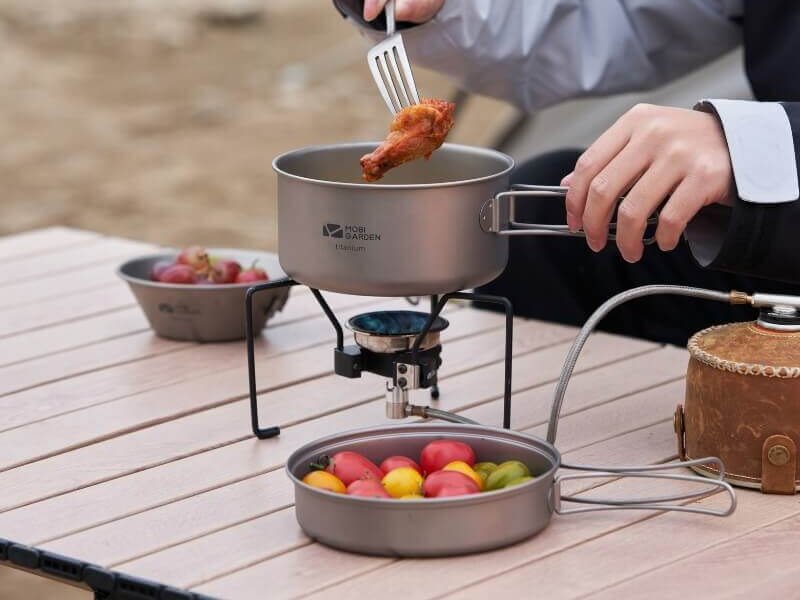Titanium cookware has garnered a reputation for being one of the most durable and high-performing options available in the kitchen. Its strength, resistance to corrosion, and non-reactive nature make it an appealing choice for many home cooks and professional chefs alike. However, to ensure that your titanium cookware lasts for years and continues to perform at its best, it’s essential to follow some key maintenance tips and techniques. This guide will provide you with valuable insights and practical advice on how to maximize the lifespan of your titanium cookware.
1. Understanding Titanium Cookware
Titanium cookware is typically made from a combination of titanium and other materials. Most often, it features a core made of aluminum or stainless steel, with a titanium-infused non-stick coating. This combination provides excellent heat conductivity, durability, and resistance to sticking. Titanium cookware is known for its lightweight properties, scratch resistance, and the ability to handle high cooking temperatures.
2. Seasoning Your Titanium Cookware
One of the first steps in caring for your titanium cookware is to properly season it. Although many titanium cookware pieces come with a non-stick coating, seasoning can further enhance their non-stick properties and protect the surface from damage.
How to Season Titanium Cookware:
- Clean the Cookware: Wash the cookware with warm, soapy water and a soft sponge. Avoid abrasive scrubbers that could damage the surface.
- Dry Thoroughly: Ensure the cookware is completely dry before proceeding.
- Apply Oil: Use a paper towel or soft cloth to apply a thin layer of cooking oil (such as vegetable or canola oil) to the surface of the cookware.
- Heat the Cookware: Place the cookware on a stovetop burner over medium heat for a few minutes, allowing the oil to heat and bond with the surface.
- Cool and Wipe: Let the cookware cool down, then wipe away any excess oil with a clean paper towel.
3. Cooking Techniques for Titanium Cookware
To ensure your titanium cookware performs optimally and lasts longer, it’s important to use proper cooking techniques.
Avoid High Heat: Titanium cookware is designed to handle high temperatures, but using excessively high heat can damage the non-stick coating and warp the cookware. Stick to medium to medium-high heat settings for most cooking tasks.
Use Proper Utensils: Always use wooden, silicone, or plastic utensils to avoid scratching the non-stick surface. Metal utensils can cause significant damage and compromise the cookware’s performance.
Preheat Gently: Preheat your cookware over low to medium heat. Sudden temperature changes can stress the cookware and potentially cause warping or damage.
Avoid Overcrowding: When cooking, avoid overcrowding the cookware. This can lead to uneven cooking and put unnecessary strain on the cookware.
4. Cleaning and Maintenance
Proper cleaning and maintenance are crucial to extending the lifespan of your titanium cookware.
Cool Before Cleaning: Allow your cookware to cool down before cleaning. Placing hot cookware in cold water can cause warping and damage.
Gentle Cleaning: Use warm, soapy water and a soft sponge to clean your titanium cookware. Avoid using abrasive cleaners or scrubbers, which can scratch the surface.
Avoid Soaking: While it’s important to clean cookware after each use, avoid soaking titanium cookware for extended periods. Prolonged exposure to water can affect the coating and integrity of the cookware.
Dry Immediately: After washing, dry your cookware thoroughly with a clean towel. This helps prevent water spots and potential rusting.
5. Storing Titanium Cookware
Proper storage is key to preserving the condition of your titanium cookware.
Stack Carefully: If you need to stack your cookware, place a soft cloth or paper towel between the pieces to prevent scratching. Avoid stacking cookware with rough or abrasive surfaces.
Store in a Dry Place: Keep your cookware in a dry area to prevent moisture buildup, which can lead to rusting or damage.
Avoid Storing in Cabinets with Harsh Conditions: If possible, store your cookware in a cabinet where it’s protected from extreme temperatures or humidity.
6. Troubleshooting Common Issues
Even with the best care, you may encounter some issues with your titanium cookware. Here are some common problems and solutions:
Non-Stick Coating Issues: If the non-stick coating begins to deteriorate or lose its effectiveness, it may be due to overheating or using metal utensils. To address this, stop using high heat and switch to non-metal utensils. If the coating is significantly damaged, it may be time to replace the cookware.
Discoloration: Titanium cookware can sometimes become discolored over time. This is often harmless and does not affect performance. To reduce discoloration, avoid using high heat and ensure the cookware is properly cleaned and dried.
Warping: Warping can occur if cookware is exposed to sudden temperature changes or high heat. To prevent warping, avoid extreme temperature shifts and use appropriate cooking temperatures.
7. Benefits of Proper Care
Taking the time to properly care for your titanium cookware provides several benefits:
Longevity: With proper maintenance, your titanium cookware can last for many years, providing reliable performance and durability.
Optimal Performance: Well-maintained cookware ensures even heat distribution and non-stick properties, enhancing your cooking experience.
Cost-Effectiveness: By extending the lifespan of your cookware, you can avoid the need for frequent replacements, saving money in the long run.
Titanium cookware is a valuable investment for any kitchen, offering exceptional durability, performance, and versatility. By following these tips and tricks for seasoning, cooking, cleaning, and storing, you can maximize the lifespan of your titanium cookware and enjoy its benefits for years to come. Proper care not only ensures that your cookware performs at its best but also helps maintain its appearance and functionality, making your culinary adventures more enjoyable and efficient.
With these guidelines in mind, you’re well on your way to becoming a master of titanium cookware, making the most of its unique properties and keeping it in top condition. Happy cooking!
